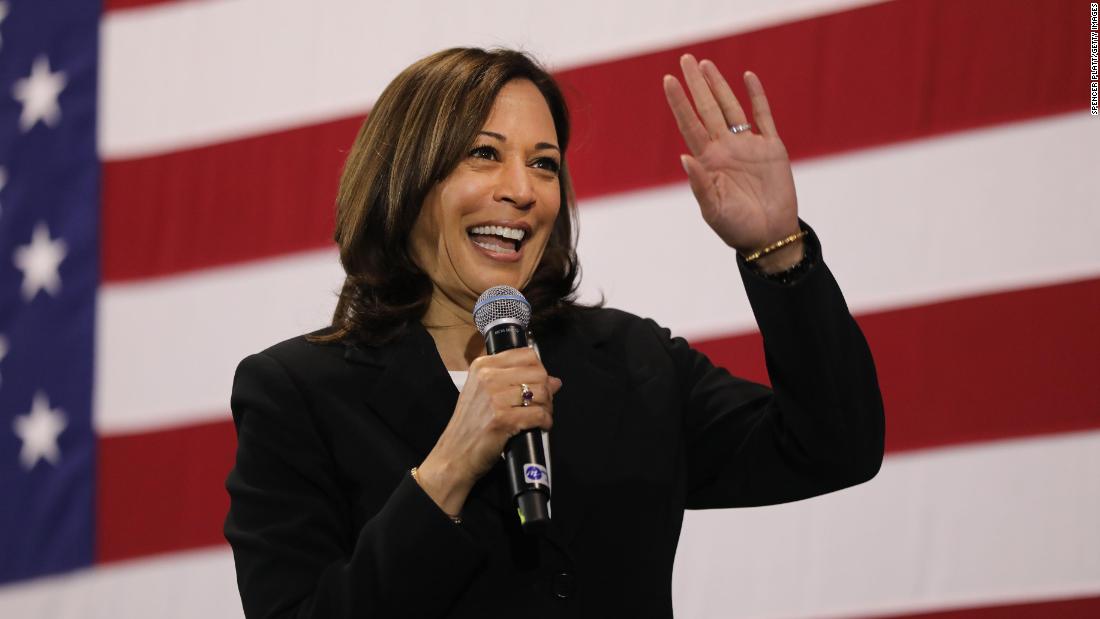
Harris has been criticized by activists on the Democratic party's left for decisions she made as California's attorney general and San Francisco district attorney -- including on criminal justice reforms and truancy.
On Saturday to a predominantly middle aged southern crowd, Harris bucked that criticism and declared that she believes safety is a civil right that all people are entitled, and sought to dismiss the myth that black people don't want "public safety."
"There have been those who have questioned my motivations, my beliefs and what I have done," she said at the Palmetto State's NAACP Freedom Fund dinner in Columbia.
"But my mother used to say, you don't let people tell you who you are. You tell them who you are. So that's what I'm gonna do. That's what I'm gonna do. Because let me be clear - self-appointed political commentators do not get to define who we are and what we believe," Harris told the room that responded with a furor of applause and a near-standing ovation.
By addressing this head on, Harris is attempting to reframe her record as a prosecutor, and to a voting constituency she considers key to her campaign — black democrats in South Carolina and the rest of the country.
Black voters made up 61% of South Carolina's Democratic electorate in 2016.
Referencing the name of an unarmed black man who was shot by a white police officer in Charleston in 2015, Harris lamented the tensions African Americans face with law enforcement.
"What we don't want is excessive force," she said. "Or for being Black to be considered probable cause. What we don't want is for a parent to have to sit down with their 12-year-old and have "the talk" and explain to that child he may be arrested, he may be stopped, he may be chased, or he may be shot, because of the color of his skin. What we don't want is any more cases like Walter Scott."
To that, she highlighted how she prosecuted violent criminals and launched investigations "into acts of discrimination by law enforcement agencies. All because the people deserved justice."
Since launching her bid in January, critics have repeatedly written scathing op-eds, including one in the New York Times, that accused the former attorney general of staying silent on criminal justice reforms under her purview, such as not taking a side on California's three strikes law.
This comes as just last month, Harris shifted her stance on how police departments should handle fatal police shootings and alleged police brutally, saying that they should be carried out by independent investigators after previous arguing that local elected officials should lead any probes.
The 2020 hopeful said last month that if elected president, she would lead a Department of Justice that would double the civil rights division and direct law enforcement to counter the rise of extremism in the US.
And Harris has proposed legislation earlier this month that would support public defenders to improve representation for low income defendants, and touted her proposed policies on gun control as long overdue while acknowledging that she is a gun owner due to her line of work.
Another issue that's dogged Harris' throughout the campaign is her stance on truancy. In April, she expressed "regret" over backing a 2011 California truancy law as the state attorney general due to "unintended consequences" such as the criminalization of parents.
To an attentive crowd, she again defended her decision, framing it as holding the "system accountable" instead of being responsible for creating legislation that threatened to prosecute parents, who some feared would be poor and people of color.
"I held the system accountable, and got those kids back in school -- not by sending people to jail, but by getting families the resources they needed, because those children deserved justice."
Harris' speech culminated in a fierce argument that she is uniquely posed to take on President Donald Trump because of her prosecutorial roots.
She received a standing ovation, littered with a fervent "you go Kamala!" from a crowd member, when she said, "What we do want is a justice system where no one is above the law, not even the President of the United States."
Later she added, "We must hold him accountable by prosecuting the case in front of the American people against four more years of this Administration. And I've prosecuted a lot of cases. But rarely one with this much evidence."
Lillian Davis-Miller, a 68-year-old NAACP member, called Harris' speech a "hit," and said it was necessary for African Americans.
"Sen. Harris touched on every point, every issue that plagues black communities, areas of crime, things involving education and equality," Davis-Miller told CNN. "It helps the people in South Carolina to really understand the platform and where she's coming from. She's making public things that need to be addressed." Davis-Miller added that she believes the speech will help Harris in the Palmetto State.
"So NAACP, we have a winning case," she said. "We have a winning case and we need a new president."
Bagikan Berita Ini














0 Response to "Kamala Harris defends criminal justice record in speech to South Carolina NAACP"
Post a Comment